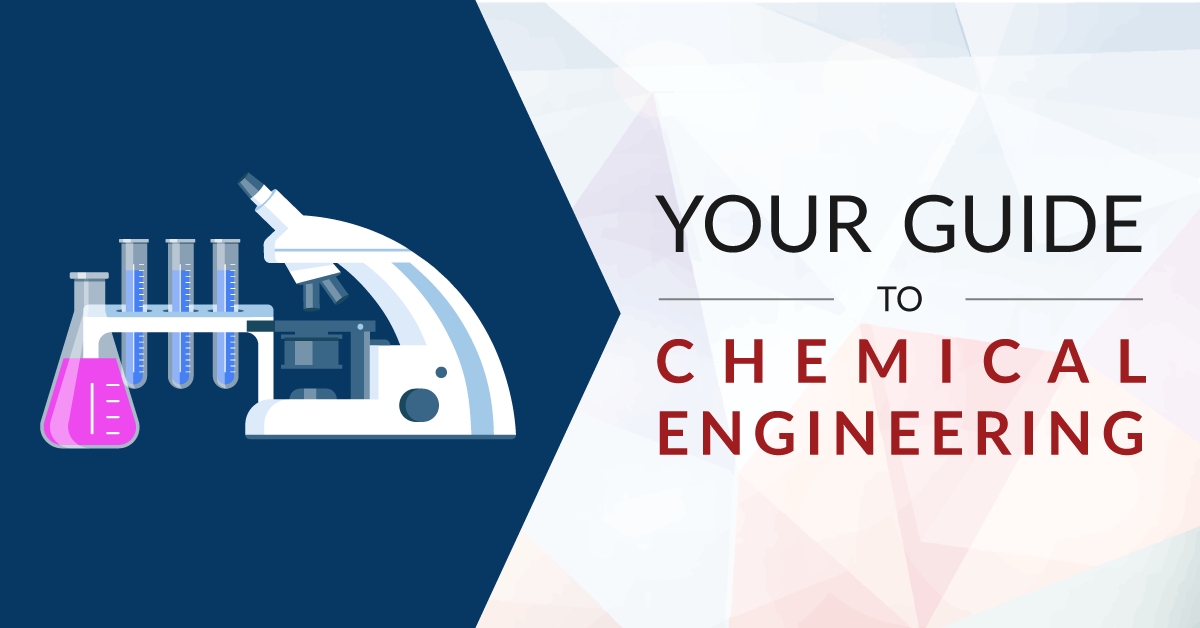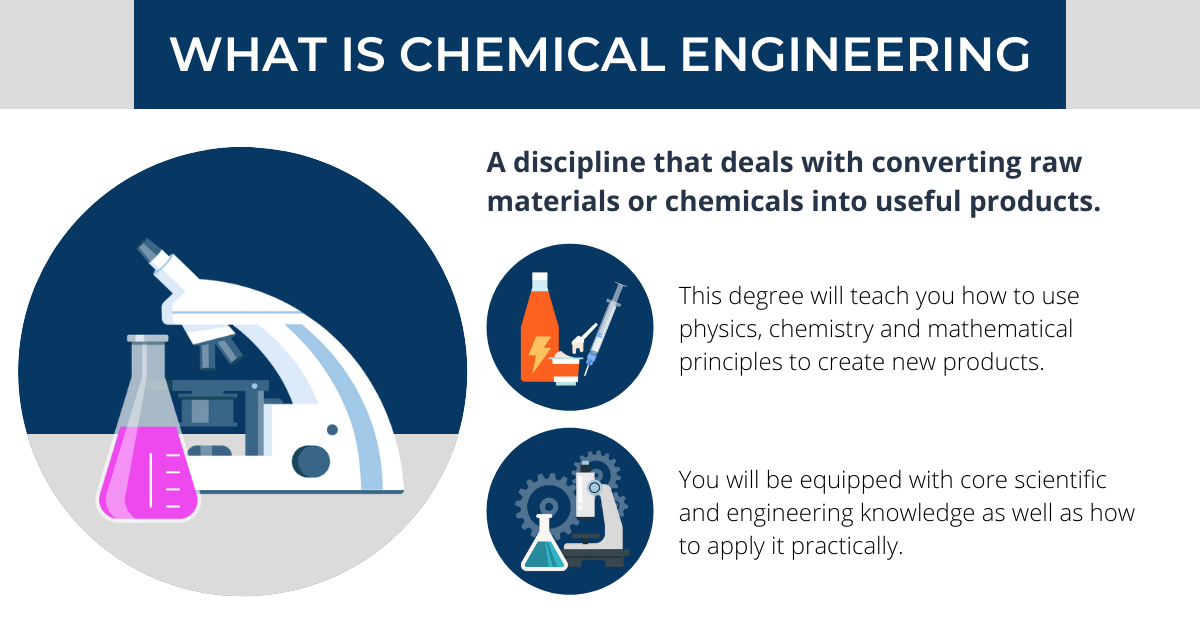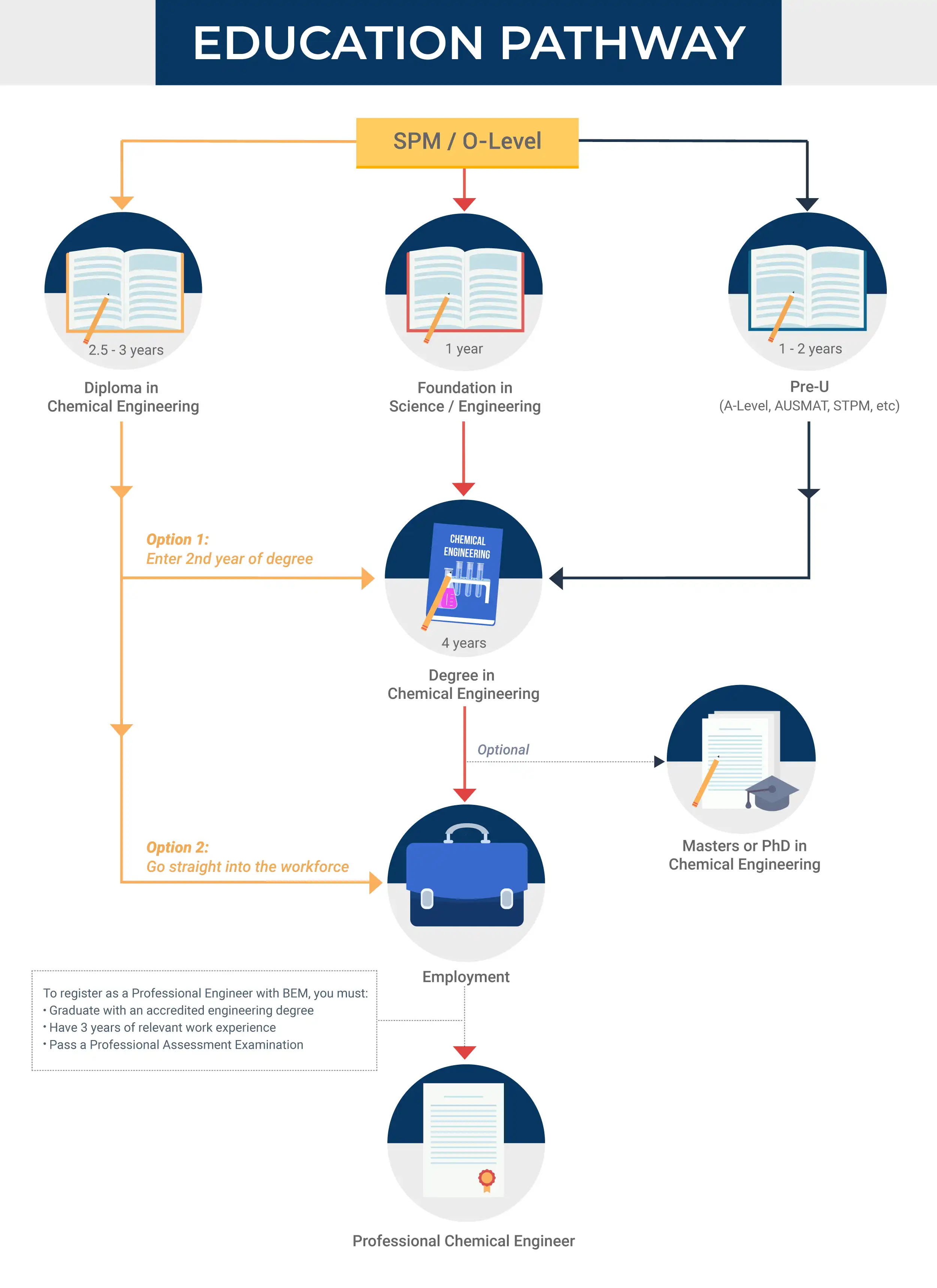The Complete Guide to Studying Chemical Engineering in Malaysia
What do you need to pursue a chemical engineering course in Malaysia? Learn about its entry requirements, modules and career prospects in this guide.

Do you enjoy the study of mathematics, physics and chemistry? Do you like the idea of experimenting and transforming raw materials into products on a large scale? Want to explore a field of study that can help to improve the quality of people’s lives?
If you say yes, then chemical engineering could be the programme for you.
In this guide, we’ll take a look at chemical engineering, a subset of the engineering discipline. You will learn what the study of chemical engineering entails, the entry requirements, job prospects for chemical engineering graduates and the best universities in Malaysia to study chemical engineering.
Interested in becoming a chemical engineer? Keep on reading.

University of Nottingham Malaysia
Chemical Engineering MEng (Hons)
✓Accredited by the Board of Engineers Malaysia (BEM) and the worldwide Institute of Chemical Engineers (IChemE)
#1. What is Chemical Engineering?

Chemical engineering is an engineering discipline that deals with converting raw materials or chemicals into useful products through economical, commercial processes.
Think of insulin, MSG, toothpaste and yoghurt. What do they have in common? Aside from making our lives better, they are all products of chemical engineering. Chemical engineers use physics, chemistry and mathematical principles to efficiently design and manufacture items on a large scale, allowing us to have affordable access to these products. From food, clothing and medicine to plastics and electronics, chemical engineering touches many products in our everyday life.
By studying chemical engineering, you’ll be equipped with core scientific and engineering knowledge to be able to engineer new and efficient chemical and manufacturing processes. You’ll be able to select the right process conditions and equipment to create products economically while ensuring production quality and safety.
Fields of Chemical Engineering
Chemical engineering is a subset of the engineering discipline. While there are many branches of chemical engineering, here are some of the key ones.
| Field | What It Is |
|---|---|
| Process engineering | Focuses on the design, operation and optimisation of chemical and biochemical processes. This includes plant design and layout as well as machine and process design. |
| Materials engineering | The study of the properties of materials and how they can be used to improve products. |
| Biochemical engineering | Concerned with the combination of biology, chemistry and engineering to help develop new products and processes. |
| Biomedical engineering | Concerned with the application of chemistry, medicine and engineering to develop and improve on medical and healthcare processes. |
| Food engineering | Concerned with the application of chemistry and engineering to develop more efficient food products and food development processes. |

#2. Entry Requirements for Chemical Engineering
a) Subjects required
To study chemical engineering, you must have studied these subjects for SPM or equivalent:
- Mathematics
- Any Science subject, ideally Chemistry and Physics
At A Levels, STPM or equivalent, you need to take the following subjects if you want to study a Degree in Chemical Engineering:
- Mathematics
- Physics
- Chemistry (recommended)
b) Requirements for Diploma in Chemical Engineering
These are the general entry requirements for a Diploma in Chemical Engineering:
- SPM (or equivalent): Minimum 3Cs, including Mathematics and 1 other Science / Technical / Vocational subject, as well as a pass in English
c) Requirements for Degree in Chemical Engineering
To pursue a Degree in Chemical Engineering, you need to complete a pre-university programme and meet the entry requirements.
- A Levels: Minimum 2Ds including Mathematics and 1 Science subject (preferably Chemistry)
- STPM: Minimum 2Cs including Mathematics and 1 Science subject (preferably Chemistry)
- Foundation in Science or Foundation in Engineering: Minimum CGPA of 2.00
- Diploma: Minimum CGPA of 2.00
In addition, it is advisable to have at least a C in Mathematics and 1 other Science / Technical / Vocational subject as well as a pass in English at SPM level.
#3. Studying a Chemical Engineering Course
a) What subjects will you study in chemical engineering?
The chemical engineering programme is meant to prepare you for a career in science. In your study, you will focus on reinforcing your understanding of essential scientific and engineering knowledge as well as your lab skills. Some of the subjects you will learn include:
- Thermodynamics
- Material and energy balance
- Chemical kinetics and reactor design
- Momentum, heat and mass transfer
- Separation process
- Process design
- Process control and instrumentation
- Safety and environmental protection
- Environmental studies
- Plant and equipment design and economics
On top of lectures and tutorials, you can expect your studies to include laboratory work, site visits, group and individual projects, and industrial training.
b) How long is a Chemical Engineering course?
A Diploma in Chemical Engineering can take up to 3 years to complete.
Meanwhile, a Degree in Chemical Engineering is typically 4 years long. It’s crucial to note that the Board of Engineers Malaysia (BEM) does not recognise 3-year engineering programmes for registration as a Graduate Engineer.
c) How much does it cost to study Chemical Engineering in Malaysia?
A Degree in Chemical Engineering, meanwhile, typically costs around RM59,100 – RM209,500.
#4. Your Education Pathway To Become a Professional Chemical Engineer in Malaysia

Here’s the pathway to becoming a professional chemical engineer in Malaysia.
Step 1: Complete a pre-university, foundation or Diploma in Chemical Engineering
The first step after SPM is to complete a pre-university or a foundation programme. Your options include A Level, Australian Matriculation, STPM, Foundation in Engineering or Foundation in Science. This will usually take around 1 to 2 years to complete.
You can also consider completing a Diploma in Engineering which can take around 2.5 and 3 years. This option will allow you to immediately enter the workforce or continue a degree starting from year 2.
Step 2: Complete a recognised 4-year Degree in Chemical Engineering
Next, you’ll need to enrol into a Chemical Engineering Degree. Depending on the programme, this can take about 3 to 4 years to complete. However, if you wish to gain professional status as a professional engineer in Malaysia, you must study an accredited Chemical Engineering Degree with a duration of 4 years.
If your degree is from Malaysia, it must be from a university that’s accredited by the Engineering Accreditation Council of the Board of Engineers Malaysia (BEM). If you are pursuing a degree from an overseas university, it must be a signatory to the Washington Accord.
Completing this degree will allow you to enter the workforce.
Step 3: Register as a Graduate Engineer and gain practical experience
After graduating from a recognised 4-year Degree in Chemical Engineering, you may register with BEM as a Graduate Engineer.
To gain the status of a professional engineer, you must have at least 3 years of practical working experience and pass a Professional Assessment Examination by BEM.
Step 4: Register as a Professional Engineer
Once you’ve met the criteria to be a professional engineer through working experience and passing the Professional Assessment Examination, you can register yourself as a professional engineer with BEM.
As a professional engineer, you are entitled to use the abbreviation “Ir.” before your name or “P.Eng.” after your name to denote your professional engineer status.
In summary, it will take you at least 5 – 6 years from SPM to become an engineer. Meanwhile, becoming a registered professional engineer will take about 8 – 9 years.

#5. Should You Study Chemical Engineering?

a) Is chemical engineering right for you?
If you’re wondering whether you should study chemical engineering, here are some questions to think about:
- Do you have good grades in mathematics and science?
- Can you think logically and solve complex math problems?
- Are you a critical thinker?
- Are you skilled at practical work?
- Do you enjoy experimenting in the laboratory?
- Are you fascinated by the wonders of science and how it can lead to new discoveries?
- Are you comfortable with having to potentially work in labs or processing plants?
If you answered yes to most of these questions, chemical engineering may be right for you!
b) Skills required to be a chemical engineer
Here are some key skills a good chemical engineer should have:
- Critical thinking skills to solve complex problems
- High level of scientific knowledge
- Strong foundation in engineering knowledge and principles
- Creative and innovative thinking
- Keen attention to detail with a methodical approach
- Commercial and business awareness
- A curious mind

University of Nottingham Malaysia
Chemical Engineering MEng (Hons)
✓Accredited by the Board of Engineers Malaysia (BEM) and the worldwide Institute of Chemical Engineers (IChemE)
#6. Job Options With Chemical Engineering
Chemical engineering is a vast field and you can find employment in a wide range of industries. Here some careers that you can pursue upon graduating:
- Chemical engineer
- Biotechnology engineer
- Biomedical engineer
- Food process engineer
- Petroleum engineer
- Materials engineer
- Process engineer
- Safety engineer
#7. Best Universities for Chemical Engineering in Malaysia
Want to be a chemical engineer? Check out some of the best universities for chemical engineering in Malaysia.
University of Nottingham Malaysia
Semenyih, Selangor
Chemical Engineering MEng (Hons)
Intake
Sep
Tuition Fees
RM226,000
Get RM300 Rebate when you enrol through EduAdvisor! T&C apply.









